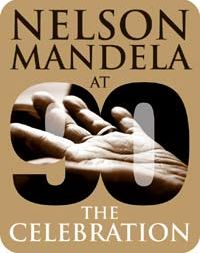
May 22, 2008 – In the fourth interview of our “In Conversation With” series to commemorate Nelson Mandela’s 90th birthday year, Former Chief Justice and former defence attorney for Nelson Mandela in the Rivonia sabotage trial, Arthur Chaskalson, talks with Tara Turkington about the challenges of leadership and establishing a human rights culture South Africa and around the world.
TT: What is justice? What do you think justice should be?
AC: That is a very complex question, but if we’re going to reduce it to a very simple, basic level, justice is to respect the inherent dignity of other people, to treat them with the dignity that they deserve, and to understand the impact of your own actions on others.
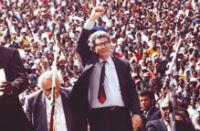
Arthur Chaskalson at a 1994 rally in Johannesburg to mark Nelson Mandela’s release.
(Image: Unknown)But justice is much more complex than that. When you talk about justice, you often talk about law and justice. There is often a divide between law and justice in the sense that the law prescribes certain actions and the outcome of that is not always just, as far as the individual caught up in the case is concerned.
So the great challenge today is to try and bring law and justice closer together, and I think that is one of the requirements of our Constitution. If you look at the fundamental values of our Constitution, they entrench dignity, equality, freedom and democracy. So the law should be in line with that.
TT: It’s inevitable to talk about the xenophobia that’s going on in the country, and I wanted to ask you about the space between our Constitution and Bill of Rights, which are applauded all over the world, and the practical realisation of our Bill of Rights.
AC: I think a lot of the trouble arises out of the circumstances of people’s lives. Where people are living in great poverty, without employment, without adequate housing, without means to sustain themselves on a decent basis – there’s little dignity in living in those conditions. And those are fault lines in our society – the great distinction between wealth and poverty and the large number of people who are living in poverty. That needs to be addressed ... it’s a huge task.
But if you talk about respect for human rights and possibly the conduct of people, it’s true that there is much that happens in our society that is inconsistent with the values of our Constitution. But that doesn’t mean that the values of the Constitution aren’t of importance … they are the framework of the society we are building and the framework of our law. It doesn’t really help to say that not everybody lives according to the values of the Constitution. The challenge is to create a society where those values are realised.
TT: How much lies in leadership and what is the role of the judicial system in that process?
AC: You reach the judicial system at the end of the road, where something has gone wrong so somebody comes to court – because they are being charged with unlawful acts which negate the dignity of other people (rape, murder, abusive conduct) – when people have not complied with the Bill of Rights. In another aspect, matters come before the court where people are claiming rights under the Bill of Rights and feel that they are not being respected.
The courts do have some important work to do in setting frameworks and holding all people who exercise public power, and at certain levels people who exercise private power, to the requirements of the Bill of Rights.
So they really have important parts to play in establishing a framework and setting down the rules within which government must function and we must live our lives. But the Constitution does that. The courts give it practical application to day-to-day situations and point out where it goes wrong and call upon people to comply with it.
But courts aren’t really major agents for change. The major agents for change must be civil society, ordinary people living within society, and there are a whole host of people who fall into that category. It’s not simply one leader. Things don’t happen because of one great leader. One great leader, a person like Mr Mandela, had a profound impact on our society, but it requires many other actors, many other levels of society, to create a caring society.
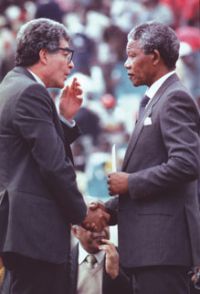
Arthur Chaskalson and Nelson Mandela.
(Image: Unknown)TT: How do you think we’re doing?
AC: This is a pretty bad time, because of what has happened in the last couple of days with the attacks on foreigners. That’s quite awful. It’s horrible to see it and horrible to read about it. You’ve got to back in time. People sometimes forget what it was like 15, 20 years ago.
If you look at the terrible conditions in which people were living, if you just look at the external appearances of people then, of children who were growing up with no hope at all ... Now, children are growing up with some opportunities. It doesn’t mean that they are all going to be realised. Obviously there are a lot of people whose hopes haven’t been realised, but you mustn’t look to them as the norm. There are still thousands and thousands of people whose hopes have been realised, which would not have been the case 15 or 20 years ago. So I’ve got no doubt that the country is a much better place than it used to be. That it still has an enormous way to go is a different story.
You see these issues particularly with events like the attacks on foreigners, the expression of xenophobia which has come through in the last week – you can see those are the underlying tensions in society. You don’t find people in the wealthy suburbs attacking their neighbours because they come from France or Italy or Nigeria or wherever. They are very satisfied with their lives. I think this is an expression of anger, or envy, of frustration. And so it’s a warning signal. It has to be addressed on the basis of why this happens. What are we doing that creates this sort of situation? Why are behaving in this way? What can we do to address the causes of this aberrant behavior? Because it is aberrant behaviour.
TT: Going right back in time: when you were defending Mr Mandela and other people in the Rivonia Trial, at that time did you have a sense of the history that you were making – of how historic and meaningful what you were doing was going to be for the country?
AC: It was clearly a key moment in our history, where leaders of not only the African people but of all black people were being put on trial. The defence which was run was not a denial of the main allegations but a justification: that we had no choice to do other than what we chose to do. The whole case was run on the basis of putting the state on trial. So I think it was obvious to all of us that it was a very important case, but looking back I don’t know that one could have realised exactly what would happen.
I remember Alan Paton giving evidence in mitigation of sentencing, basically talking about capital punishment, saying, “There’s going to be a time when you’re going to have to negotiate with leaders and there must be leaders around with whom you can negotiate, and these are those leaders.” That didn’t go down too well! But it was absolutely right, as history has proved.
TT: Morgan Tsvangirai has been criticised for staying out of Zimbabwe for too long since the election and losing support because he is not there. I think sometimes we tend to think that our problems are only ours, but they are not.
AC: They are not; if you look around the world you see all sorts of things that happen in this country happening in other parts of the world as well. You see poverty and degradation in other parts of the world, but that doesn’t mean that it’s all right.
TT: You touched a little on the contribution that Mr Mandela has made. If there hadn’t been Nelson Mandela, would there have been someone else? How much of a difference did he make and what does his legacy mean for the world? How could we be using it better?
AC: That’s a somewhat artificial question, because he was there.
TT: I guess I was asking about what you said about leadership and it being many people.
AC: I do believe that there are many people, and Mr Mandela himself has been at pains to say that it’s not just one person, that there are many, many people who have been in the struggle for freedom and sacrificed a great deal, and that it isn’t simply the result of one person. I think he is right, but you can’t underestimate the importance of the leadership qualities which he brought to bear and which were shared by people around him, people like Mr [Walter] Sisulu, and others who were very committed to the values that he was committed to and shared in the leadership and in promoting those values amongst their supporters.
So I think leadership is crucial, in the sense that it’s leaders who set the tone, and if we look at countries which are in decline and look at the leaders in those countries, you often find that the leaders have set values and behaved in a particular fashion where the country moves into undemocratic, oppressive ways in which the public begin to behave in a particular way because that is what is impressed upon them.
“ “One great leader, a person like Mr Mandela, had a profound impact on our society, but it requires many other actors, many other levels of society, to create a caring society.” ”
And if you go back to a country like Nazi Germany, the profound impact of the leadership of Hitler at that time and the influence it had within the whole of Germany, and if you look at South Africa, the leadership of the apartheid policies had a huge impact on white South Africans. You must remember that at the last elections before the system collapsed, 80% of the white population supported apartheid. You can’t underestimate the impact of leaders and decisions that leaders take, but decisions taken by leaders are in themselves insufficient without the support of others in important positions in society and without the support of communities. So the two go together.
TT: What about our current leadership in South Africa – are there promising signs? Can you talk about our current leadership and what the challenges are for them?
AC: We are in a period of political change, in the sense that there is a leadership change taking place within the country and that creates uncertainty and instability and people aren’t quite sure of what is going to happen. That uncertainty affects people, who like to know more or less what the policies are and what’s going to happen. So I do think we are going through a period of instability.
TT: But there’s a certain aspect of positivity in that as well – people become more critical and more self-critical and reflective about where we are. There’s an opportunity there to grow.
AC: Yes, I think the question really is to what extent we are going to have greater open debate around policies. I do think we have had a fairly open society; the newspapers have been free to print quite a lot of things over the past few years, and we haven’t been living in a country where dissent is stifled.
I think what has happened is that there have been people who have been reluctant to criticise policies put in place by leadership in the ANC, not necessarily because of any fear but simply because they don’t want to be seen to be critical. And there’s been a sense that you mustn’t criticise the ANC because you would be undermining the revolution, which is not completed, as it were, and therefore people tend to be very measured in what they say.
And I think it would be good for society to have much more openness, and for people to articulate their views; it’s good for political leaders to hear them. If people don’t articulate their views, you may get the wrong impression as to what is happening in your country. I think it’s got to do with a political culture. If you look around central issues like land, there’s always been a strong protest movement, people marching about land, talking about land, they haven’t been buried and forgotten. And if you look at matters like AIDS, there’s been huge debate around AIDS. So one shouldn’t think there hasn’t been public debate – I think there has.
And one of the issues is going to be the whole relationship between the executive, parliament and the judiciary as to whether each retains the independence that it is entitled to and how they relate to one another. I think that over the past 10 or so years the judiciary has been independent.
I think that parliament has tended to follow the executive and so we tend not in public to see the debates which may go on in private. I think it would be better if we could see more public debate and if there was room for people who disagree to express that disagreement without necessarily leaving the party. It’s up to the political leadership to try and create structures under which people can express different views in public as well as in private so that the debate becomes richer.
TT: I want to ask you about the state of human rights in the world. Do you think we are moving more, universally, towards a culture of human rights and actually living out those human rights? Do you think things are getting better or worse?
AC: I think that certainly in recent times, things have been getting worse.
If you go back historically, at the end of the Second World War, with the shock at what had happened in the Nazi occupation of Europe and what had happened inside Germany under the Nazis and the terrible things which were done, there was a revulsion against extreme conduct of that nature, and a sense that no longer would one avoid it on the basis of not wanting to interfere with the internal affairs of a country.
One of the founding principles of the UN Charter was that there should be respect for fundamental human rights and freedoms and the dignity of all people. And you have the commitment to respect rights in the Universal Declaration of Human Rights, though there were some countries that didn’t go along with that. There were international instruments for human rights that were then built up over a long period of time. From the 1950s right the way through to the second half of the century, there was a much greater concern for human rights at the international level; there were treaties; countries were called upon to report and to account for their actions; and there was great pressure through the world community and the UN structures to comply with fundamental human rights. Provisions were made to deal with refugees, to deal with gender discrimination, to deal with discrimination on sexual orientation. A number of treaties were brought into existence which affected people who were marginalised and discriminated against. And though throughout the world there wereplaces where these conventions were not adhered to and though we know that in many parts of the world there were unjust regimes and harsh penalties and arbitrary laws were in place, there was an international pressure against it.
I think that since the attack on the World Trade Centre in 2001, with the United States taking the lead, there has been a reversal of that pressure. The measures put in place in the United States for arbitrary detention, for rendition, for harsh punishments, many say for torture – because there have been allegations of torture which were denied, but that becomes a somewhat disingenuous argument as to what is and isn’t torture, as if cruel and degrading treatment was permissible … I think that that has set a pattern, because if what was the leading proponent of human rights in many parts of the world is acting contrary to those fundamental principles in the name of the security of the state, unjust regimes around the world say “we can too”.
And that’s something I have encountered. I have been chairing a panel established by the International Commission of Jurists – that’s a Geneva-based organisation which consists of lawyers and judges around the world. I was asked to chair a panel of eight judges and lawyers to look at the impact of counter-terrorism measures on human rights law and international humanitarian law, and the panel was broken down into committees to conduct hearings in different parts of the world. We had hearings involving 39 countries. And it seems clear that in the name of counter-terrorism, terrible things are taking place in many parts of the world, and that unjust regimes who have been practising torture and the like tend to say “This is counter-terrorism.” It’s been said in our presence, “Why speak to us, why not speak to the United States?”
It seems perfectly clear to me that the policies adopted by the US, particularly, since September 2001, have had an impact on the international human rights structures. And there is a risk – I don’t think it will happen, but there is a risk that they could unravel. That after 50 years of building towards a world that respects the dignity of people, under the pressures which now exist, they could begin to unravel.
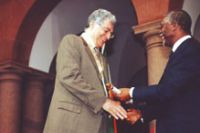
Arthur Chaskalson receiving the award of Supreme Counsellor of the Baobab (gold), a national honour.
(Image: Unknown)TT: Do you think they are more fragile now than they have been in the last 50 years?
AC: Undoubtedly. When you look at the passing of the Patriot Act, it’s now well accepted that this massive act was rushed into Congress and that many of the people who voted for it hadn’t read it. They hadn’t studied it, they didn’t know what its implications were, there weren’t public hearings, they just rushed it through. About that time, I think, the shock of the attack on the World Trade Centre did have an impact upon life in America. I think the press at that stage were less enquiring than they have become.
If you look at some of the leading papers today there is quite sharp criticism of American policies and of the fundamental issues of torture, rendition, and detention without trial, of fair trial. They have this so-called rendition to justice which involves travelling to foreign countries, kidnapping people and handing them over to other countries for torture. Now that is the sort of thing that is happening and that is denied. The fact of the matter is if there are so many reports of what is happening, then it doesn’t seem reasonable to believe that they don’t know ... also, why are they handing them over to other regimes and not keeping them themselves?
TT: But as you said yourself, it takes many actors and people and institutions to build an international culture of human rights. What about China – where do we start?
AC: The point is there was international pressure on China to become more open, to engage with other countries, to open up and accept certain basic principles. It’s very difficult to exert that pressure when you yourselves are engaged in conduct which is difficult to justify.
I do think there has been a change of atmosphere in the US. The sense that I have is that civil society has been quite outspoken, that many organisations are addressing these issues. I think the media is now more critical. I think that even within the broad organs of civil society and parts of Congress you are getting criticism you didn’t have before. I think that is a good thing and my sense is that as long as the pressure continues, as long as there is an exposing of what is happening, a debate around what is happening, a pointing out to people what the implications of policies are, you find that historically it’s left for later generations to correct what went wrong before, and that has happened and I think it will happen again.
There’s been a dip but as long as people and organisations and countries who are committed to human rights continue to bring these matters to the surface, I think that in the end we will get back on line. But it means that people have got to do something.
TT: That means being brave and speaking out.
AC: In some places you’ve got to be very brave, particularly when you are in a society which is heading in a particular direction and the political leaders are urging you to behave in a particular fashion. And there are extremely brave people in countries like Pakistan, where there have been terrible abuses of human rights over the past four or five years, people in the Middle East – there are lots of countries in which people are speaking out against human rights abuses. And they are very brave because they are put at risk. And it’s because of people like that that the world moves forward.
A shorter version of this interview was published in the City Press newspaper, on May 25th, 2008.
About Arthur Chaskalson
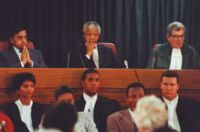
Arthur Chaskalson with President Nelson Mandela and Justice Minister Dullah Omar at the first sitting of the Constitutional Court in February 1995.
(Image: Nelson Mandela Foundation)Arthur Chaskalson was appointed the first president of the Constitutional Court in 1994, became chief justice of South Africa in 2001 and retired in 2005. He has been honoured by universities, international organisations and the country for his contributions to promoting human rights, constitutionalism and democracy, and now chairs the Eminent Jurists’ Panel appointed by the International Commission of Jurists.
During his career at the Johannesburg Bar, to which he was admitted in 1956, he appeared for the defence in important political trials, including the Rivonia Trial in which Nelson Mandela and other ANC leaders were convicted. The organisation he helped set up in 1978 and directed for 15 years, the Legal Resources Centre, continued to challenge apartheid laws through the courts.